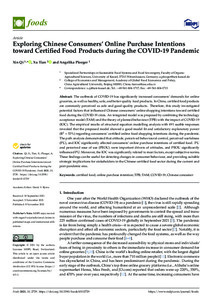| dc.date.accessioned | 2022-01-05T13:05:15Z | |
| dc.date.available | 2022-01-05T13:05:15Z | |
| dc.date.issued | 2021-11-08 | |
| dc.identifier | doi:10.17170/kobra-202201045357 | |
| dc.identifier.uri | http://hdl.handle.net/123456789/13487 | |
| dc.description.sponsorship | Gefördert durch den Publikationsfonds der Universität Kassel | ger |
| dc.language.iso | eng | eng |
| dc.rights | Namensnennung 4.0 International | * |
| dc.rights.uri | http://creativecommons.org/licenses/by/4.0/ | * |
| dc.subject | certified food | eng |
| dc.subject | online purchase intention | eng |
| dc.subject | TPB | eng |
| dc.subject | TAM | eng |
| dc.subject | COVID-19 | eng |
| dc.subject | Chinese consumer | eng |
| dc.subject.ddc | 300 | |
| dc.title | Exploring Chinese Consumers’ Online Purchase Intentions toward Certified Food Products during the COVID-19 Pandemic | eng |
| dc.type | Aufsatz | |
| dcterms.abstract | The outbreak of COVID-19 has significantly increased consumers’ demands for online groceries, as well as healthy, safe, and better-quality food products. In China, certified food products are commonly perceived as safe and good-quality products. Therefore, this study investigated potential factors that influenced Chinese consumers’ online shopping intentions toward certified food during the COVID-19 crisis. An integrated model was proposed by combining the technology acceptance model (TAM) and the theory of planned behaviour (TPB) with the impact of COVID-19 (IOC). The empirical results of structural equation modelling analysis with 491 usable responses revealed that the proposed model showed a good model fit and satisfactory explanatory power (R2 = 53%) regarding consumers’ certified online food shopping intentions during the pandemic. The path analysis demonstrated that attitude, perceived behavioural control, perceived usefulness (PU), and IOC significantly affected consumers’ online purchase intentions of certified food. PU and perceived ease of use (PEOU) were important drivers of attitudes, and PEOU significantly influenced PU. Moreover, the IOC was significantly related to most factors, except subjective norms. These findings can be useful for detecting changes in consumer behaviour, and providing suitable strategic implications for stakeholders in the Chinese certified food sector during the current and post-pandemic eras. | eng |
| dcterms.accessRights | open access | |
| dcterms.creator | Qi, Xin | |
| dcterms.creator | Tian, Xu | |
| dcterms.creator | Ploeger, Angelika | |
| dc.relation.doi | doi:10.3390/foods10112729 | |
| dc.subject.swd | China | ger |
| dc.subject.swd | Verbraucherverhalten | ger |
| dc.subject.swd | COVID-19 | ger |
| dc.subject.swd | Electronic Commerce | ger |
| dc.subject.swd | Kaufmotivation | ger |
| dc.subject.swd | Lebensmittel | ger |
| dc.subject.swd | Zertifizierung | ger |
| dc.type.version | publishedVersion | |
| dcterms.source.identifier | eissn:2304-8158 | |
| dcterms.source.issue | Issue 11 | |
| dcterms.source.journal | Foods | eng |
| dcterms.source.volume | Volume 10 | |
| kup.iskup | false | |
| dcterms.source.articlenumber | 2729 | |


